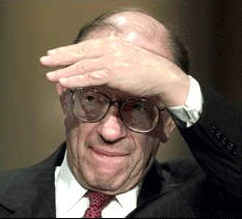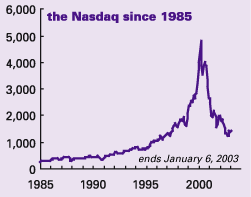Home
Mail Articles
Stats/current
Supplements
Subscriptions
Links
The following article appeared in Left
Business Observer #102, September 2002. It retains its copyright
and may not be reprinted or redistributed in any form - print,
electronic, facsimile, anything - without the permission of LBO.
Bubble accounting
Fortunately for the administration, Iraq is driving bear market
news off the front pages (even LBO's).
But fallout from the bubble's bursting continues to float earthwards,
and the question of who will pay, politically or financially,
has barely been asked.
An editorial in the August 19 issue of The
Nation asked some questions, and answered a few too. It blamed
the bubble on "conservatives" and proposed a new New
Deal as a solution. It's more complicated than that.
In the (anonymous) editorial, "conservative" is used
interchangeably with Republican, especially the hard ideological
right kind. But that isn't fair: Bill Clinton and Robert Rubin
deserve lots of blame too. But Clinton's name appears only for
his marginal repair of Reagan-era gutting of antitrust enforcement
(as if the promotion of competition weren't hard on workers).
The name of Robert
Rubin, who served as Treasury Secretary between jobs at Goldman
Sachs and Citigroup, and who pressed the liberalization
of capital flows on a reluctant outside world, doesn't appear
at all. The Mexican, Asian, and Russian crises - global bubbles
that hurt millions when they burst - were all Clinton era disasters,
to which administration policy (like the capital account liberalization
that Stiglitz talks about on p. 4 of this issue)
contributed generously.
Sir Bubble
Which isn't to deny that the bubble's most important promoter,
more important even than Jack Grubman, was a real movement conservative
- Alan Greenspan, Ayn Rand's most famous disciple.
 It's gratifying to see Greenspan's
stock sinking. Several analysts have written up his embarrassing
speech at the Federal Reserve Bank of Kansas
City's annual elite retreat at Jackson Hole. But since this publication has
been making fun of Greenspan for 15 years, long before it was
fashionable, some piling on is in order.
It's gratifying to see Greenspan's
stock sinking. Several analysts have written up his embarrassing
speech at the Federal Reserve Bank of Kansas
City's annual elite retreat at Jackson Hole. But since this publication has
been making fun of Greenspan for 15 years, long before it was
fashionable, some piling on is in order.
Greenspan argued that no one could really have known a bubble
was underway - and even if he could, there was nothing he could
have done about it anyway. Keeping to his line during the mania,
he maintained that a bubble can only be recognized after its bursting,
which might be a nice Hegelian point, but isn't a helpful guide
to policy. Lots of observers less esteemed than Greenspan noticed
one at the time, and presumably it's his job to stay on top of
these things.
He could have raised interest rates earlier, which would have
burst the bubble, though it might have thrown the economy into
recession as well; he can't be faulted for worrying about that.
But he could have raised margin requirements on stocks - forcing
investors who buy shares with borrowed money to put up more cash.
This would reduce demand for stocks, but also send a hostile signal
to the markets. At Jackson Hole, he argued that raising margin
requirements would have had no effect on stock prices.
That's not what he said at a policy
meeting in September 1996. After listening to then Fed governor,
now top Bush economic advisor, Lawrence Lindsey offer a comprehensive
case that a bubble was well underway, Greenspan commented: "I
recognize that there is a stock market bubble problem at this
point and I agree with Governor Lindsey that this is a problem
we should keep an eye on....We do have the possibility of raising
major concerns by increasing margin requirements. I guarantee
that if you want to get rid of the bubble, whatever it is, that
will do it. My concern is that I am not sure what else it will
do." Presumably his worry was about effects on the real economy,
a reasonable concern, but he knew there was a bubble and that
he could have pricked it. He did speak the phrase "irrational exuberance" a few months later,
but when that was greeted with bad reviews, he turned into the
New Economy's leading promoter and the guarantor of stock prices.
Values
Back to the Nation editorial, which laments a "profound
inversionin the governing values of US economic lifethe triumph
of finance over the real  economy. In the natural
order of capitalism, the financial system is supposed to serve
the economy of production - goods and services, jobs and incomes
- but the narrow values of Wall Street have become the master."
It's usually dangerous to apply the word "natural" to
a social system; it's been used to justify everything from fascism
to anarchism. And historically and theoretically the claim is
a bit odd. Capitalism has always been about maximizing profits.
Financiers exerted tremendous control over the real economy in
the late 19th and early 20th centuries. Financial assets are the
ways by which an owning class constitutes itself in a world of
large public corporations; this wasn't a revolution in values
but an assertion of the rights of ownership. Throughout the 1980s
and 1990s, shareowners demanded higher profits, which they mostly
got from the early 1980s until the mid-1990s - the fundamental
reason the bubble started expanding in the first place. The first
part of the bull market was thoroughly rational exuberance among
a class that was winning fight after fight.
economy. In the natural
order of capitalism, the financial system is supposed to serve
the economy of production - goods and services, jobs and incomes
- but the narrow values of Wall Street have become the master."
It's usually dangerous to apply the word "natural" to
a social system; it's been used to justify everything from fascism
to anarchism. And historically and theoretically the claim is
a bit odd. Capitalism has always been about maximizing profits.
Financiers exerted tremendous control over the real economy in
the late 19th and early 20th centuries. Financial assets are the
ways by which an owning class constitutes itself in a world of
large public corporations; this wasn't a revolution in values
but an assertion of the rights of ownership. Throughout the 1980s
and 1990s, shareowners demanded higher profits, which they mostly
got from the early 1980s until the mid-1990s - the fundamental
reason the bubble started expanding in the first place. The first
part of the bull market was thoroughly rational exuberance among
a class that was winning fight after fight.
After years of reaction, a new New Deal would be nice, but
it pays to think about how we got the first one. To use the old
language, the U.S. ruling class was terrified by the prospects
of bankruptcy and appropriation. The USSR looked plausibly successful
while the capitalist world was in depression, and domestic Communists
and other radicals were pervasive and influential. Huey Long was
eating into Roosevelt's base. Workers were taking over factories
and mines. Faced with such threats, the ruling class cut some
deals. As soon as the war was over, they began campaigning passionately
to undo the social compromise. At home, unions were purged and
Reds were persecuted, and we entered a state of permanent war
against the USSR. It would take a popular mobilization that's
just not imaginable at present (and probably the defection of
a large portion of the "developing" world from IMF orthodoxy
as well) to make a new New Deal a possibility.
There are encouraging signs of a Southern defection, with mass
organizing (into little Paris communes or spontaneous soviets)
sweeping Argentina, Lula on the verge of winning in Brazil, strong
anti-privatization movements across Latin America and Africa.
Not in the U.S. though. Maybe another 1,000 off the Nasdaq
will change that.
Home Mail
Articles
Stats/current
Supplements
Subscriptions
Links
 It's gratifying to see Greenspan's
stock sinking. Several analysts have written up his embarrassing
speech at the Federal Reserve Bank of Kansas
City's annual elite retreat at Jackson Hole. But since this publication has
been making fun of Greenspan for 15 years, long before it was
fashionable, some piling on is in order.
It's gratifying to see Greenspan's
stock sinking. Several analysts have written up his embarrassing
speech at the Federal Reserve Bank of Kansas
City's annual elite retreat at Jackson Hole. But since this publication has
been making fun of Greenspan for 15 years, long before it was
fashionable, some piling on is in order. economy. In the natural
order of capitalism, the financial system is supposed to serve
the economy of production - goods and services, jobs and incomes
- but the narrow values of Wall Street have become the master."
It's usually dangerous to apply the word "natural" to
a social system; it's been used to justify everything from fascism
to anarchism. And historically and theoretically the claim is
a bit odd. Capitalism has always been about maximizing profits.
Financiers exerted tremendous control over the real economy in
the late 19th and early 20th centuries. Financial assets are the
ways by which an owning class constitutes itself in a world of
large public corporations; this wasn't a revolution in values
but an assertion of the rights of ownership. Throughout the 1980s
and 1990s, shareowners demanded higher profits, which they mostly
got from the early 1980s until the mid-1990s - the fundamental
reason the bubble started expanding in the first place. The first
part of the bull market was thoroughly rational exuberance among
a class that was winning fight after fight.
economy. In the natural
order of capitalism, the financial system is supposed to serve
the economy of production - goods and services, jobs and incomes
- but the narrow values of Wall Street have become the master."
It's usually dangerous to apply the word "natural" to
a social system; it's been used to justify everything from fascism
to anarchism. And historically and theoretically the claim is
a bit odd. Capitalism has always been about maximizing profits.
Financiers exerted tremendous control over the real economy in
the late 19th and early 20th centuries. Financial assets are the
ways by which an owning class constitutes itself in a world of
large public corporations; this wasn't a revolution in values
but an assertion of the rights of ownership. Throughout the 1980s
and 1990s, shareowners demanded higher profits, which they mostly
got from the early 1980s until the mid-1990s - the fundamental
reason the bubble started expanding in the first place. The first
part of the bull market was thoroughly rational exuberance among
a class that was winning fight after fight.